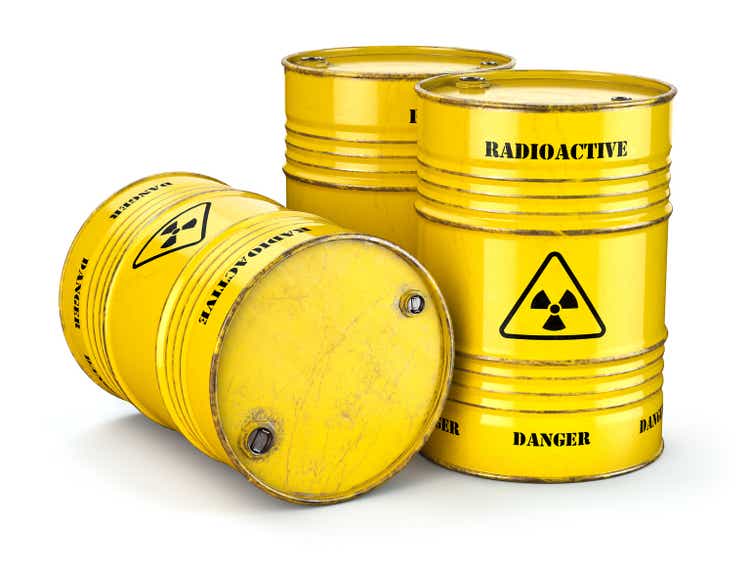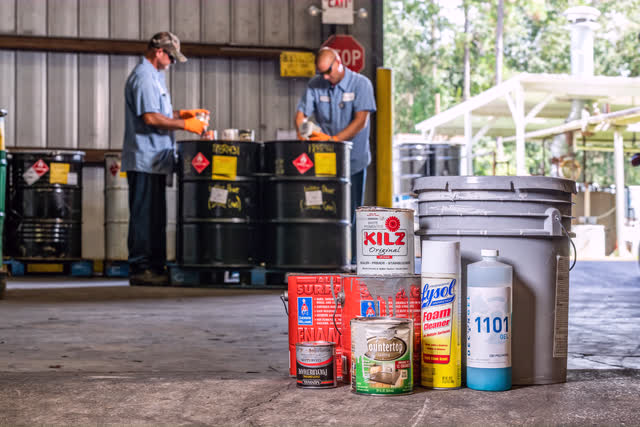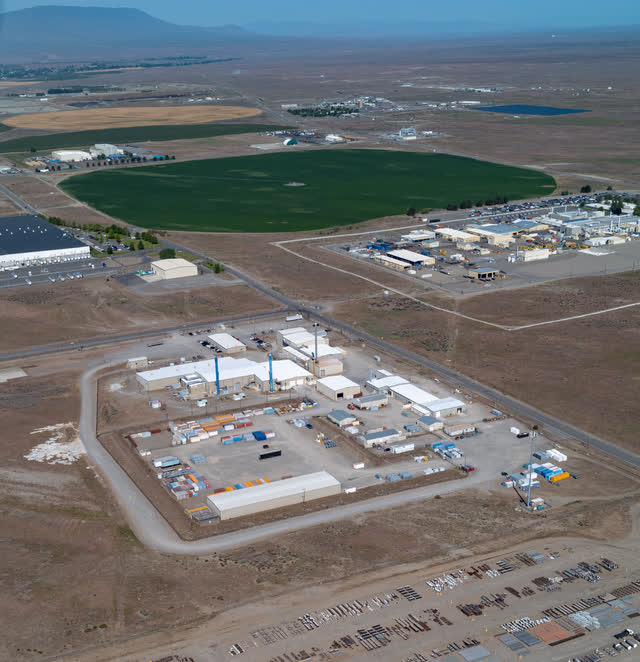Bet_Noire/iStock via Getty Images
Perma-Fix (NASDAQ:PESI) has been one of my most disappointing investments thus far in 2022. While I expected the company to turn the corner from the Covid delays and headwinds in early 2022, that pivot did not start happening until late in the year. The good news is that the company is finally starting to see business return to pre-pandemic levels, as will be discussed in more depth below. Further, the company diversified its business internationally and in new industries during this past year, providing opportunity for additional growth in 2023 and beyond. In addition, with the Hanford nuclear waste cleanup project expected to proceed in 2023, PESI is now set up to have a strong year in 2023. Below, I will discuss some of these opportunities in more depth.
PESI’s Services Segment
One of the reasons for the weakness in PESI’s stock has been their relatively poor performance in their Services segment. This segment generally produces lower margins than their Treatment segment, but on the other hand provides more predictable and longer revenue streams. On the 3Q22 call, CEO Mark Duff made clear that PESI had not lost any Services business they expect to win, but rather that government agencies like the DoE, DoD, and EPA have been slow in coming back up to speed following the pandemic in terms of awarding bids. On a more positive note, Duff highlighted: “the Federal government has begun announcing new projects that had been on hold. As a result, we realized an increase in procurements in September of ‘22, which we believe will continue in the fourth quarter of ‘22.” For whatever it’s worth, I have heard similar stories from multiple other CEOs across various other industries as well, both with respect to the delays and with new awards finally being issued in Q4.
Even more encouraging, PESI indicated on the call that its bidding pipeline remains robust. They specifically called out over $100M in opportunities aligning with their core competencies that they expect to be released in the next few quarters. In addition to that, they have $39M in funded nuclear services contracts already in place, which the company believes bodes well for them for the remainder of 2022 and throughout 2023.
PESI’s Treatment Segment
The Treatment segment is PESI’s highest margin business, although it can be more unpredictable than the services side. As highlighted in my first article on the company, PESI’s disruption from Covid was delayed as compared to most businesses. The reason is that PESI deals with waste, which means there must be economic/industrial activity going on which creates the waste. When many businesses were shut down, PESI was able to deal with the waste created prior to the pandemic. This, then, led to a delayed response, with PESI really feeling the pain from the pandemic more in 2021, and even continuing into this year, since in 2020 and early 2021, the amount of waste created was significantly lower than pre-pandemic norms given the slowdowns throughout most industries.
That said, as with the Services segment, PESI is seeing improvement in their overall waste receipts. Of note, this increase includes new clients in both the commercial and international waste markets, which according to management on the 3Q22 call, has increased by nearly 50%. PESI’s effort to broaden its customer base, including into the commercial utilities and oil & gas space, is also witnessed by the marked increase in requests for proposals (RFPs). CEO Duff noted the company bid on 80 RFPs in Q3, a 33% jump from what they saw earlier in the year (which itself was much higher than prior norms).
Hanford Site Opportunity
Of course, no conversation about PESI is complete without mentioning the Hanford site cleanup. Personally, I find this somewhat unfortunate because I believe the best way to approach PESI as an investment is to look at their core business and growth opportunities, and to then consider Hanford as a “free call option.” By that, I want to stress that I believe PESI’s core business is currently undervalued and should produce attractive returns over the next 1-2 years. But in addition to that, you also have this longstanding opportunity with Hanford, which should it go forward with PESI involved, likely makes the stock a 5-10 bagger from current levels. I do not consider this latter scenario to be my base-case scenario, but my best-case scenario. It would seem management wants to establish similar expectations, as CEO Duff noted on the 3Q22 call during the Q&A session:
Let me expand on [Hanford] a little bit. I did want our investors to know that our growth plans, our infrastructure, our budgets and expectations have all been developed irrespective of that award for [Hanford]. While that award would obviously be extremely transformative to us, if we are not awarded that, we do have our plan set up assuming we haven’t. So, in other words, all of our marketing initiatives, all of our other growth initiatives are all moving along. So, we are hopeful that irrespective of that win, we are going to be seeing the growth that we saw prior to the pandemic. I just wanted folks to know that we are well positioned if we don’t, to continue with that growth strategy, and we are making every effort to make that happen as well.
So, despite the fact that PESI believes—as do I—that they are well-positioned without Hanford, because of its potential explosive upside for the company, Hanford deserves discussion. As with some of the Services and other Treatment business, the Hanford program continues to move forward, but often at a slower pace than desired by PESI investors. In my April 2022 article I showed that PESI’s unique capabilities to help at Hanford are endorsed by important federal, as well as local, government agencies. On the 3Q22 call, CEO Duff added additional agencies/individuals who have come out in support of PESI’s solution, including: the US General Accounting Office and Senators Rand Paul and Maggie Hassan. Despite the hope that the Hanford site would be awarded to one of the two building conglomerates by EOQ3, according to Duff, the DoE stated in a September industry conference in D.C. that their intention is to award the contract by the EOQ1 ‘23.
As it relates to Hanford, we should note that within a couple of years of that project starting—assuming PESI’s group wins the bid—the company could be treating up to 1M gallons of waste per year. While the company has yet to give guidance on the dollar amount expected to be earned per gallon, sources familiar with the process believe PESI should earn somewhere around $70/gallon at likely a 65-70% gross margin. Obviously, a win at Hanford would be a game-changer for the company!
I noted already that I believe PESI is undervalued irrespective of the Hanford project. What I should also point out is that Hanford is not necessarily a zero-sum game for PESI. By that, I mean that even if PESI’s bidding conglomerate is not awarded the Hanford project, PESI may still benefit from the project moving forward, albeit to a lesser degree. This was teased out of CEO Duff during the 3Q22 conference call Q&A. When asked if PESI might still benefit if their team loses the bid, Duff responded:
When the [Hanford] facility is up and running, it will generate, when it’s full capacity, several million gallons of waste a year – different types of waste. One of those is about 1 million gallons a year of effluent liquid that we would likely be the ones to treat. Now again, we don’t have a contract signed. However, it’s low-level wastewater, and that’s what we do there just off-site (author’s note: PESI’s Northwest facility is about 20 miles downstream from Hanford). So, one could speculate we would be treating that waste, and there will be other waste as well from [Hanford] that we anticipate to be treating and have discussed those opportunities with the incumbent [tank] contractor now. So, yes, to answer your question, we expect a significant amount of work from that operation as well as the other operations that are ongoing for the incumbent tank contractor or whoever wins the new one, irrespective of whether we are awarded or not.
Of course, it would be ideal if PESI’s group is directly awarded the Hanford contract, but even if they are not, PESI stands to benefit significantly even if the other bidder wins. Ultimately, then, it is simply a matter of Hanford moving forward one way or another for PESI to benefit.
New Opportunities
As noted earlier, PESI has been expanding their reach into new industries. But in addition to that, PESI sees multiple other new areas for growth. On the 3Q22 call, Duff highlighted upcoming initiatives and procurements with the US Army Corp of Engineers (which range from $10M to $150M in revenue) and the US Navy. The Navy is expected to decommission several dozens of ships, about a dozen of which require nuclear disposal. PESI is one of a handful of companies equipped to deal with those types of ships and currently has been working closely with the Navy on another project that leads the company to believe they stand to win some of those ship decommissioning projects. One such project alone—the Enterprise—could be in the neighborhood of $100M.
Yet another new opportunity is international waste, most specifically in various European countries. Duff highlighted a recent bid between €40 and €50 million over a 7-year period in Italy. Duff believes that project will be announced in the next several months and could be the first of many future European projects. He specifically referenced the UK starting to move radiological waste out of storage with the desire to stabilize and then destroy it for disposal. According to him, few treatment plants exist in Europe as a whole. In any case, all of these new opportunities present possible avenues of continuous growth for PESI for years to come.
Risks
One of the biggest risks for PESI is that the government delays persist through 2023. While PESI noted some of those delays are starting to subside, it’s entirely possible additional, unforeseen delays will arise in 2023. There is, of course, also the possibility PESI will not win as many of the outstanding bids as they expect once those delayed projects are awarded. Still, the most likely scenario seems to be that PESI will win its fair share of bids.
Another risk relates to the company’s liquidity. While I believe they are currently well-positioned from that standpoint, additional delays and/or unexpected losses on key projects could lead to a situation where PESI needs additional liquidity. I view this as a relatively minor risk, but one investors should keep in mind.
Valuation
With respect to valuation, I refer readers to my original PESI article linked above. In that article, I was overly optimistic about PESI’s business with various government entities moving forward quickly. However, as stated earlier, PESI had indicated—and I believe—none of that business has gone away. It will eventually be awarded and PESI will eventually get its fair share. With that in mind, I am moving my prior 2022 projections to 2024.
Now, obviously, that is disappointing to move back two years, but the upside is enormous; and I also believe reasonable, with the company growing revenue to $150M annually. That number also includes minimal contribution from Hanford. Based on that model, which is detailed in my first article, I valued PESI between $15-18/share (250-325% higher than the current share price). These numbers came from EPS estimates of over $1.20/share and EBITDA over $20M. I invite readers to review that section from my first article.
Here, however, I want to highlight another aspect we should consider with respect to PESI’s valuation. On the 3Q22 call in the Q&A, it became apparent that PESI is a likely M&A target for a larger company. Specifically, CEO Duff noted:
There has been some consolidation movement in regards to waste. And I think that will continue in the future with healthy companies.
When asked directly if PESI has been approached by a possible acquirer, Duff answered:
Well, we can’t talk about that specifically, but we are always for sale. We are a public company.
Providing further clarity, Duff highlighted:
Our focus has been squarely on getting our EBITDA back up into positive numbers after the COVID impact. We are just now getting our feet back under us. We are expecting ‘23 to look a lot better and to get back on that track, and then I think we will be more attractive.
He then went on to point out the fact that the company being taken private or acquired as a “bolt-on” to another company would clearly help EBITDA margins. That portion of the Q&A concluded with Duff agreeing that by EOY23, he expects the company to show significant potential as it relates to operating leverage at higher revenue levels.
Conclusion
As I stated previously, I view PESI as a strong investment based upon their core business opportunities to return to and eventually exceed pre-pandemic growth in revenue and profitability. The possible benefits from being awarded a share of the Hanford project and/or being acquired or taken private are additional benefits of investing in PESI at this time. With the Services Segment showing signs of recovering late in 2022 and into 2023, and the Treatment Segment expanding into new markets, I believe PESI is set up for great success in 2023.





Be the first to comment